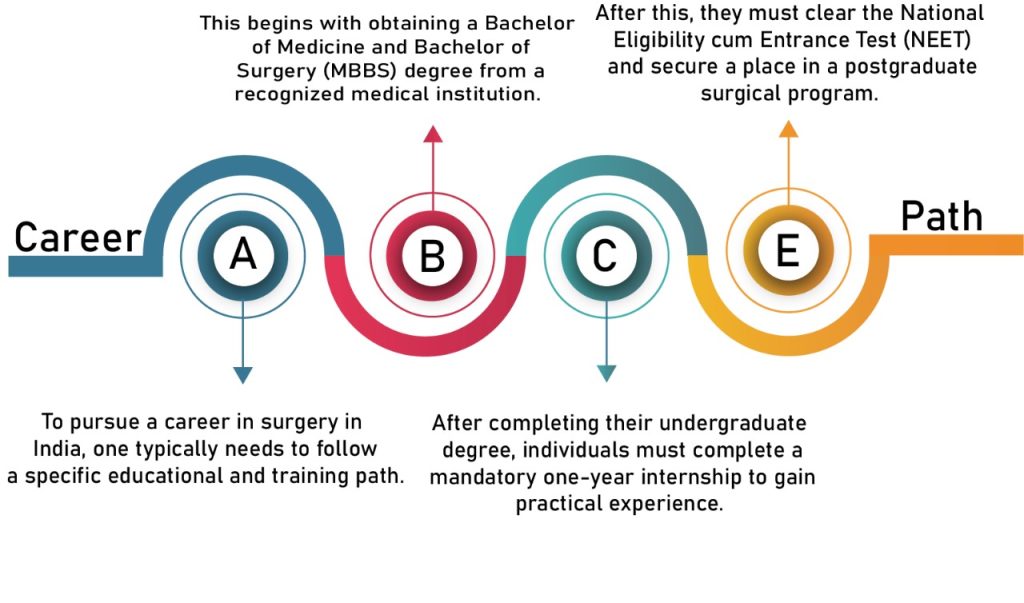Surgery is a medical specialty that involves the treatment of injuries, deformities, and diseases through operative procedures. It typically involves the use of surgical instruments and techniques to manipulate or remove tissue, organs, or other bodily structures to treat or diagnose a patient’s condition. Surgeons may specialize in a particular area of the body or type of surgery, such as orthopedic surgery, neurosurgery, cardiovascular surgery, or plastic surgery. Surgery plays a critical role in modern medicine and is often used in conjunction with other forms of treatment, such as chemotherapy or radiation therapy, to provide the best possible care for patients.

Work description
Surgeons are medical professionals who perform a wide range of procedures to diagnose, treat, and prevent various medical conditions. Their work involves analyzing patients’ medical histories, performing physical exams, ordering and interpreting diagnostic tests, and developing treatment plans.
Surgeons use their expertise and specialized knowledge to perform surgical procedures safely and effectively, often working in teams with other medical professionals, such as anesthesiologists, nurses, and surgical assistants.
Their responsibilities may also include post-operative care, patient education, and follow-up appointments to monitor the patient’s recovery.
Being a surgeon requires precision, attention to detail, and a deep understanding of human anatomy and physiology.
High Demand
The ability to make a tangible difference in patients’ lives by curing or improving their health conditions.
Lucrative salaries
A high level of job security and stability due to the constant demand for surgical procedures.
Opportunities for innovation
The potential for high earning potential, particularly for those who specialize in lucrative fields such as neurosurgery or orthopedics.
Versatility
Opportunities for research and innovation, with the ability to contribute to medical advancements.
Flexibility
The chance to work in a dynamic and fast-paced environment that challenges one’s skills and abilities.
Job satisfaction
The opportunity to work collaboratively with other medical professionals and engage in teamwork.
High stress
Long and demanding work hours, often requiring being on call or working overnight shifts.
Long hours
A high level of stress due to the responsibility of performing complex surgical procedures.
Competitive field
A rigorous and competitive training process, which can be challenging and demanding.
Constant learning
The potential for exposure to infectious diseases and hazardous substances.
Isolation
The risk of malpractice lawsuits and legal challenges.
Eye strain and other physical health issues
A significant emotional burden, particularly when patients do not recover as expected or face serious complications.
The cost of pursuing a career in surgery in India can vary depending on a number of factors, such as the type of course, the institution offering the course, and the location.
Generally, pursuing a medical degree in India can be expensive, with costs ranging from 10-25 lakhs for government institutions and upwards of 50 lakhs for private institutions.
In addition to tuition fees, there are also additional expenses such as accommodation, textbooks, equipment, and exam fees. Specialization in surgery typically requires an additional 2-3 years of training, which can also be costly.
However, there are scholarships and financial aid options available to help alleviate the financial burden of pursuing a career in surgery.
[wpcharts type=”horizontalbarchart” bgcolor=”red:gray:yellow,blue:gray:yellow,random:gray:yellow,purple:gray:yellow” min=”0″ legend=”true” titles=”2 year , 5 year” values=”3,7,5,12″]
The cost of pursuing a career in surgery in India can vary depending on a number of factors, such as the type of course, the institution offering the course, and the location.
Generally, pursuing a medical degree in India can be expensive, with costs ranging from 10-25 lakhs for government institutions and upwards of 50 lakhs for private institutions.
In addition to tuition fees, there are also additional expenses such as accommodation, textbooks, equipment, and exam fees. Specialization in surgery typically requires an additional 2-3 years of training, which can also be costly.
However, there are scholarships and financial aid options available to help alleviate the financial burden of pursuing a career in surgery.
[wpcharts type=”horizontalbarchart” bgcolor=”red:gray:yellow,blue:gray:yellow,random:gray:yellow,purple:gray:yellow” min=”0″ legend=”false” titles=”Entry-Level, Mid-Career, Senior-Level ” values=”5,15,25,35,45,55″]
Excellent academic performance, particularly in science and math courses.
Strong problem-solving and critical thinking skills.
Attention to detail and precision in work.
Excellent communication and interpersonal skills to work effectively with patients, medical staff, and other healthcare professionals.
The ability to handle high levels of stress and make quick decisions under pressure.
Physical dexterity and hand-eye coordination.
A willingness to continue learning and staying up-to-date with medical advancements and techniques.
Poor time management skills, as surgical procedures often require long hours of concentration and focus.
A lack of attention to detail, which can lead to errors and mistakes.
Weakness in hand-eye coordination, which can be a critical component of surgery.
A fear of blood or other bodily fluids, which can make it difficult to perform surgical procedures.
A lack of empathy or compassion for patients, as surgery often involves working closely with individuals who are experiencing pain and discomfort.
A lack of empathy or compassion for patients, as surgery often involves working closely with individuals who are experiencing pain and discomfort.
A lack of physical stamina, as surgical procedures can be physically demanding and require extended periods of standing or performing tasks.
Work-life balance
The work-life balance of a surgeon can be challenging due to the demanding nature of their profession. Surgeons often work long hours, including overnight shifts and on-call schedules. This can lead to a lack of free time for personal activities or spending time with family and friends.
However, many surgeons are able to find a balance between their work and personal lives by prioritizing self-care, establishing clear boundaries, and developing effective time management skills.
This may include taking time off when necessary, delegating responsibilities to other medical staff, and finding healthy ways to manage stress.

Improved access to healthcare and medical services for patients in need.
Increased public awareness of health and wellness, as well as the importance of preventative care.
Contributions to medical research and advancements that can benefit society as a whole.
Greater understanding and awareness of the human body and the factors that contribute to illness and disease.
Opportunities to work with a diverse patient population and make a positive impact on people’s lives.
Development of new surgical techniques and technologies that can improve patient outcomes and quality of life.
Cardiothoracic surgery
Surgery on the heart, lungs, and other organs in the chest.
Colorectal surgery
Surgery on the colon, rectum, and anus.
Neurosurgery
Surgery on the brain, spinal cord, and nervous system.
Orthopedic surgery
Surgery on the musculoskeletal system, including bones, joints, muscles, and tendons.
Ophthalmic surgery
Surgery on the eye and surrounding structures.
Conclusion:
In conclusion, surgery can be a challenging and rewarding career choice for those with a strong passion for medicine and a desire to make a positive impact on patients’ lives. While the field requires extensive education and training, as well as a high level of dedication and commitment, the potential rewards include a high earning potential, opportunities for professional growth and development, and the ability to make significant contributions to medical research and advancements. For those who are willing to put in the hard work and dedication, a career in surgery can be an incredibly fulfilling and meaningful path.



